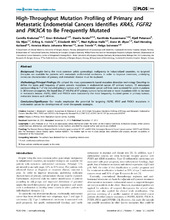High-Throughput Mutation Profiling of Primary and Metastatic Endometrial Cancers Identifies KRAS, FGFR2 and PIK3CA to Be Frequently Mutated
Krakstad, Camilla; Birkeland, Even; Seidel, Danila; Kusonmano, Kanthida; Petersen, Kjell; Mjøs, Siv; Høivik, Erling Andre; Wik, Elisabeth; Halle, Mari Kyllesø; Øyan, Anne Margrete; Kalland, Karl-Henning; Werner, Henrica Maria Johanna; Trovik, Jone; Salvesen, Helga Birgitte
Peer reviewed, Journal article
Published version
Permanent lenke
https://hdl.handle.net/1956/6521Utgivelsesdato
2012-12-27Metadata
Vis full innførselSamlinger
Originalversjon
https://doi.org/10.1371/journal.pone.0052795Sammendrag
Background: Despite being the most common pelvic gynecologic malignancy in industrialized countries, no targeted therapies are available for patients with metastatic endometrial carcinoma. In order to improve treatment, underlying molecular characteristics of primary and metastatic disease must be explored. Methodology/Principal Findings: We utilized the mass spectrometric-based mutation detection technology OncoMap to define the types and frequency of point somatic mutations in endometrial cancer. 67 primary tumors, 15 metastases corresponding to 7 of the included primary tumors and 11 endometrial cancer cell lines were screened for point mutations in 28 known oncogenes. We found that 27 (40.3%) of 67 primary tumors harbored one or more mutations with no increase in metastatic lesions. FGFR2, KRAS and PIK3CA were consistently the most frequently mutated genes in primary tumors, metastatic lesions and cell lines. Conclusions/Significance: Our results emphasize the potential for targeting FGFR2, KRAS and PIK3CA mutations in endometrial cancer for development of novel therapeutic strategies.

